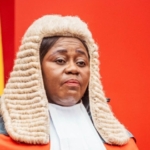
The Acting Deputy CEO of the Ghana Investment Fund for Electronic Communications (GIFEC), Abdul Aziz Mohammed, has defended the removal of the Chief Justice, stressing that the decision followed constitutional provisions and due process.
Speaking on Prime Morning on News Flash, Mr. Mohammed said the government was not surprised by the development, given the facts that were presented.
On the removal of the Chief Justice
He explained that the government’s priority was to ensure that the constitutional process was followed.
“I wasn’t surprised about the removal of the Chief Justice. The facts from the onset were very clear. As a government, what we were committed to was due process — to ensure that we carried the process through constitutional provisions. So for us, we were not too surprised.”
On the opposition’s concerns about procedure
He dismissed claims from the opposition that procedures were breached.
“Our colleagues on the other side have tried to cry foul a couple of times, yet they have been unable to point to a clear breach of procedure. We are not surprised about it.”
Mr. Mohammed noted that the office of the Chief Justice, like others such as the Electoral Commission (EC) Chair, is constitutionally insulated but still subject to Article 146, which governs removal processes.
“What we need to bear in mind is that the Chief Justice is just one of several offices constitutionally insulated from interference. Under President Akufo-Addo, an EC Chair and deputy were removed using Article 146. Under President Mahama, the Commissioner for Human Rights was also removed. Even last year, petitions were brought against the same Chief Justice. There is nothing new about this; it is just a matter of following due process.”
He stressed that the Constitution itself allows for such removals.
“The Constitution contemplated and made provisions for the removal of a Chief Justice. If that was wrong, the Constitution would not have provided for it. To me, the most important thing is whether we followed due process.”
On allegations of political motives
Responding to claims that the opposition NDC had intentions of removing the Chief Justice if elected, he denied that any official statements were made to that effect.
“I cannot remember any statement from any authorized person in the NDC that we were going to remove the Chief Justice if we were elected into government. Yes, we had our own difficulties with her, but legitimate Ghanaians petitioned the President, and he acted according to due process.”
On President Mahama’s past comments about judicial changes
Mr. Mohammed also addressed reports that former President Mahama suggested reforms in the judiciary. He insisted that the NDC’s promise was broader than targeting individuals.
“When the then flagbearer of the NDC spoke, he promised a reset across national life. That reset was not limited to the judiciary alone.”
On comparisons with EC Chair removals
He highlighted that the removal of the EC Chairperson carried even greater consequences than that of the Chief Justice.
“Why was it that under President Akufo-Addo, there was nothing wrong with removing a constitutionally insulated officer like the EC Chair? The office of the EC Chair is even more sensitive than that of the Chief Justice because a common mistake by the EC Chair can throw this country into flames.”
On future political responses
Finally, Mr. Mohammed noted that if future governments want to follow the same path, they are free to do so — provided they also respect due process.
“I have heard some opponents threaten that when they get power, they will do the same. They are at liberty to do so if they think it is right for the country. We would not stop them, but any attempt to remove a future Chief Justice must go through due process.”